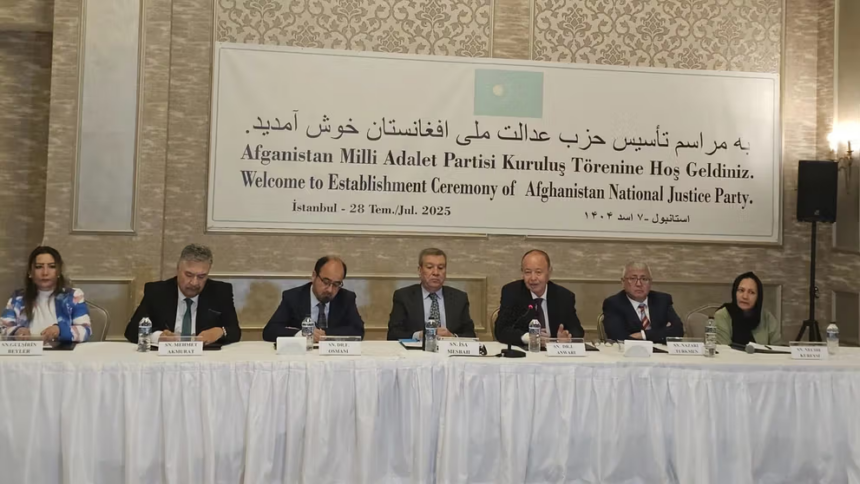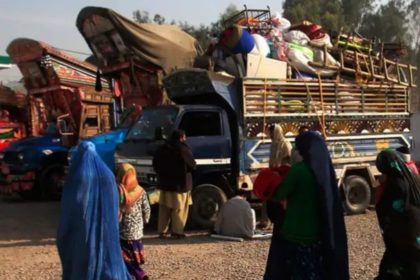RASC News Agency: In yet another attempt to revive Afghanistan’s fractured political soul from exile, a group of former ministers, parliamentarians, and diplomats from the pre-2021 republic have announced the formation of a new political entity: the National Justice Party of Afghanistan. The launch took place in Istanbul, Turkey far from the country they once governed, and now ruled by an authoritarian regime that has outlawed political pluralism and dismantled civic space. This latest initiative joins a growing list of diaspora-based movements established since the collapse of the internationally-backed republic in August 2021. Over the past four years, numerous parties, fronts, and councils have been launched by exiled figures. Yet, observers argue that none have translated into substantive political influence or effective resistance against the Taliban, which has institutionalized repression, silenced dissent, and turned Afghanistan into an ideological prison for its people.
At the inauguration of the newly formed party, its founders former ministers Faiz Mohammad Osmani and Jamahir Anwari, ex-parliamentarians Rozgeldy Oychi and Nazari Turkmen, former ambassadors Abdul Rahim Oraz and Mohammad Esa Mesbah, along with ex-senator Mohammad Anwar Bashliq asserted that the party aims to promote “justice, peaceful coexistence, and the protection of the fundamental rights of Afghanistan’s citizens.” Mohammad Esa Mesbah, former ambassador to Kyrgyzstan, was appointed as the party’s chairman. He will be joined by Nazari Turkmen and Shugofa Farhang as vice-chairpersons. In his keynote address, Mesbah stressed that the party’s vision centers on “establishing nationwide justice, empowering communities through the democratic election of local leaders, promoting education in native languages, and upholding human rights particularly those of women and children.” He underscored Afghanistan’s pluralistic identity, emphasizing that “this is a multiethnic, multi-faith nation, and this diversity must be acknowledged as a foundation for equality and peaceful cohabitation.”
While the rhetoric is aspirational, the absence of a concrete plan for political engagement inside Afghanistan underscores a sobering reality: under the Taliban’s theocratic stranglehold, all forms of political association remain banned, and any meaningful political resistance is crushed with brutality. In such a climate, the very notion of political party activity within the country is rendered effectively impossible. The establishment of the National Justice Party of Afghanistan must be seen within the broader pattern of post-2021 exile politics a phenomenon marked by the proliferation of fragmented, often ethnically-aligned political initiatives formed by former elites seeking to rebrand themselves. Following the Taliban’s seizure of Kabul and the abrupt collapse of the republic, many former officials rather than engaging in honest introspection over the failures of the past have turned to symbolic party-making abroad, devoid of grassroots support or operational relevance.
The bitter truth remains that most political structures born during the two-decade U.S. presence in Afghanistan were constructed on fragile foundations primarily ethnic, linguistic, or factional interests. These structures rarely developed into national platforms with coherent political, economic, or social strategies. Consequently, they failed to command public trust or break the cycles of ethnic patronage and power-sharing that hollowed out democratic governance. Now in exile, many of these same figures are repeating that failed formula: founding parties without platforms, issuing declarations without deeds, and proclaiming leadership without legitimacy. In the last four years alone, dozens of such exile-based political entities have been announced but none have made measurable progress in forming a credible opposition to the Taliban, either inside Afghanistan or on the regional and international stage.
Analysts warn that without a serious overhaul of their organizational structures, ideological frameworks, and methods of public engagement, such parties are doomed to irrelevance. The formation of political entities in exile, while necessary, will remain performative unless they transcend ethnic factionalism, embrace transparency, and articulate clear, actionable agendas. The Taliban regime, meanwhile, continues to impose one of the most draconian and regressive systems in the modern world targeting women, dismantling institutions, erasing civic freedoms, and ruling through coercion. In this bleak context, the Afghanistani political diaspora bears a heavy responsibility: to either redefine the political narrative through integrity, accountability, and vision or consign themselves to the margins of history.
If newly founded parties like the National Justice Party of Afghanistan fail to rise above the politics of nostalgia and exclusion, and if they cannot channel the hopes of the Afghanistani people both inside and outside the country into a tangible resistance to Taliban tyranny, their impact will remain negligible. In the absence of political innovation and courage, Afghanistan’s future will continue to be dictated by an unelected regime that thrives on fear, repression, and international complacency.






